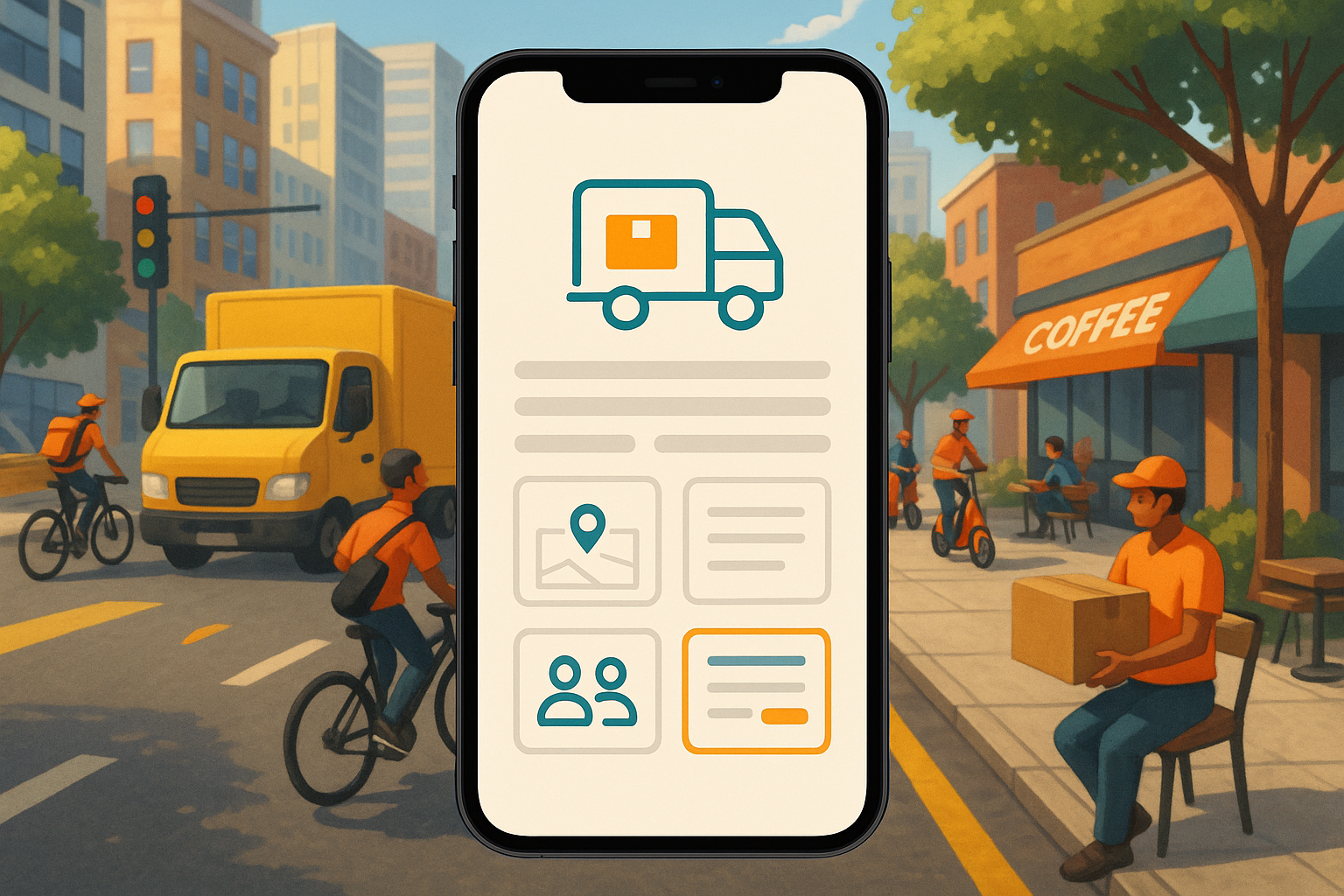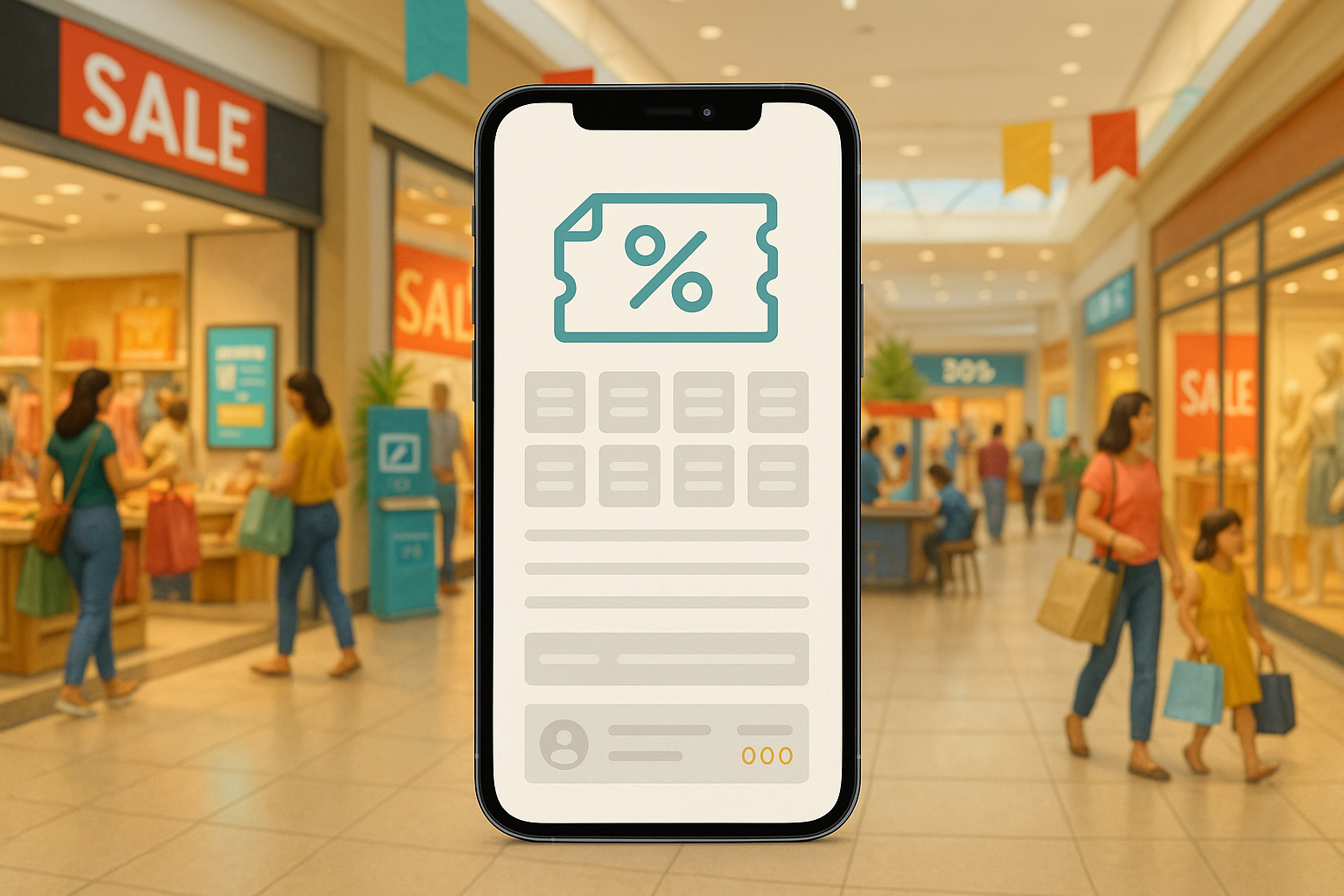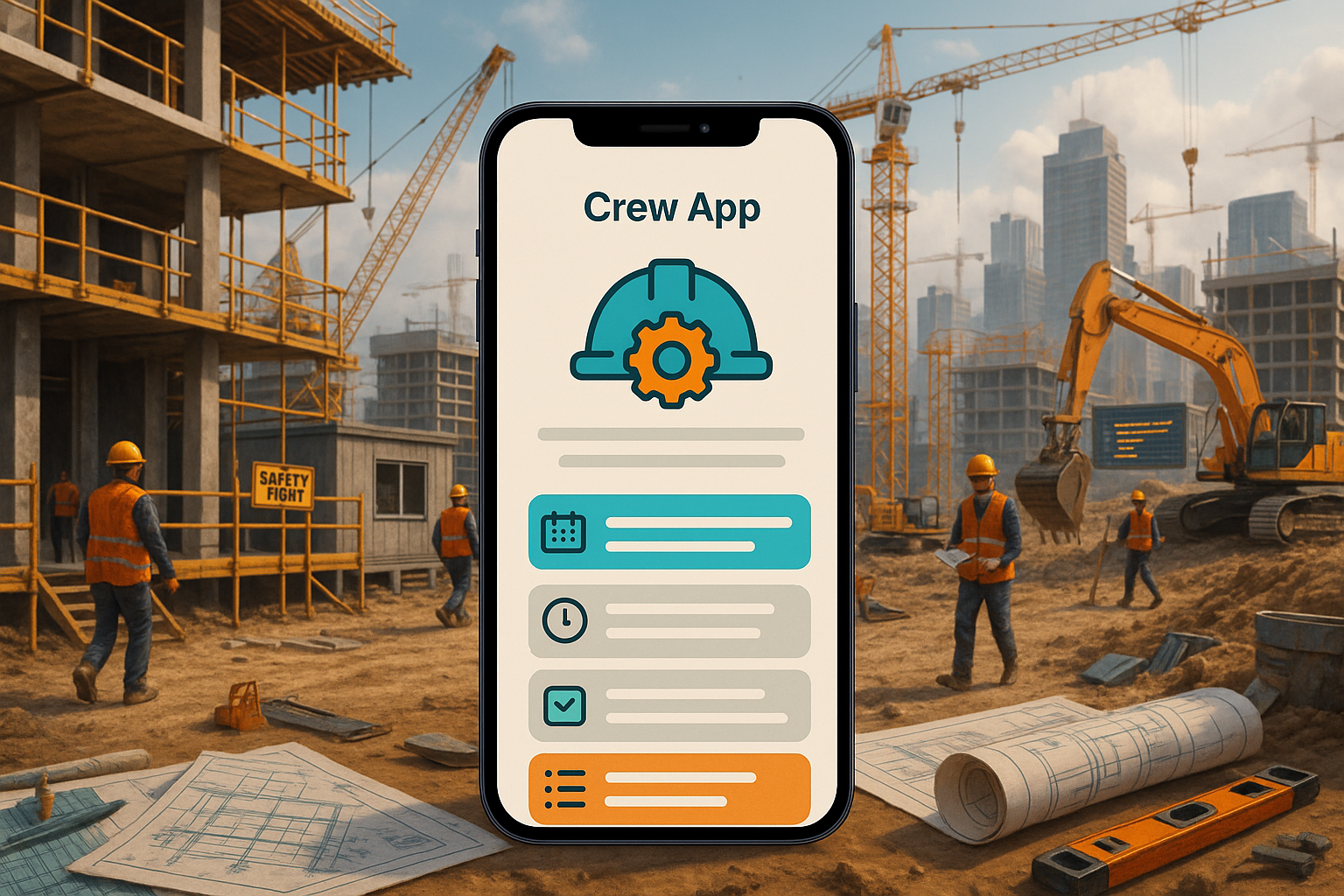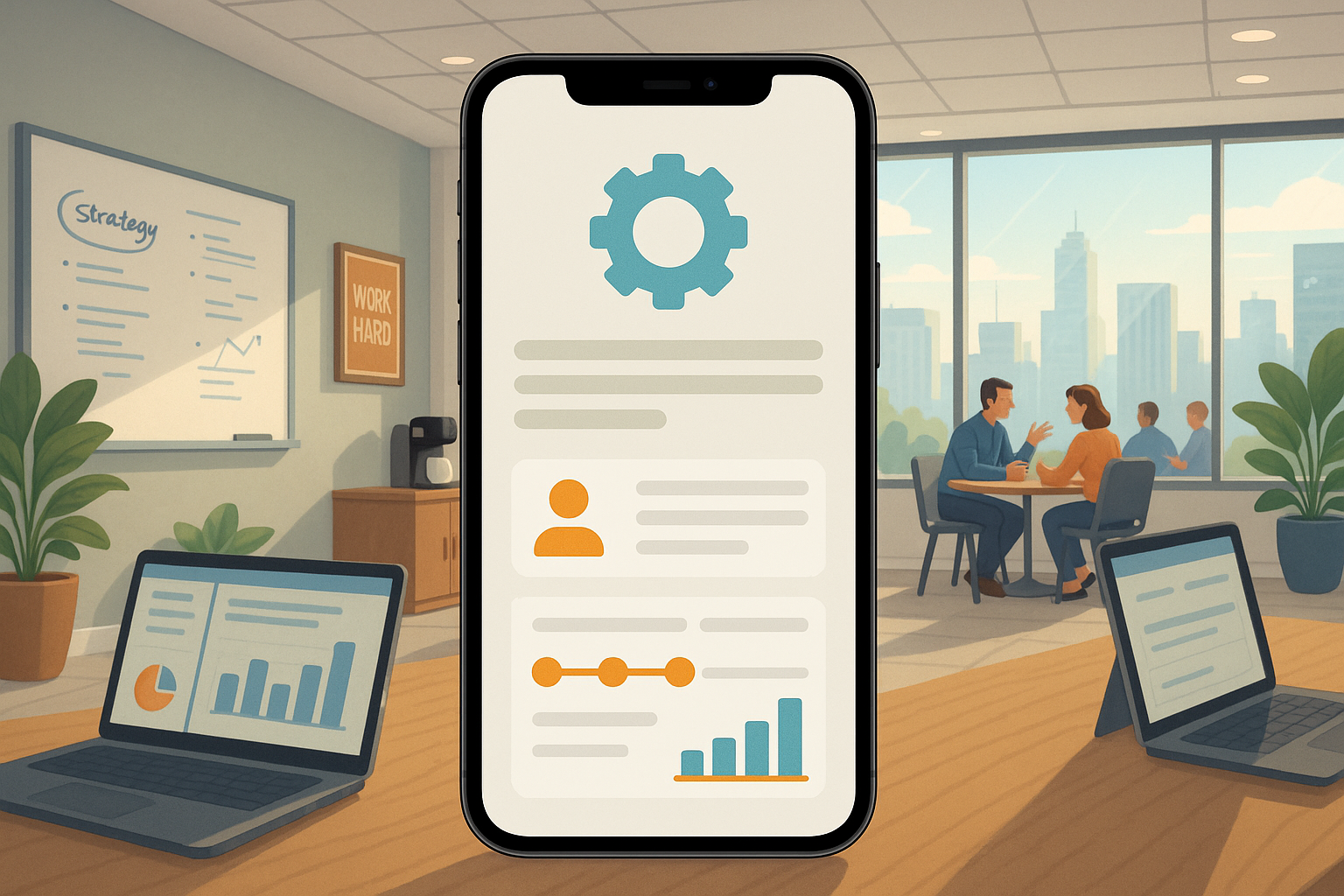Introduction
In today’s fast-paced world, the demand for fast, reliable, and transparent courier services has never been higher. Consumers and businesses alike expect to send and receive packages with the same ease and real-time visibility they experience with ride-sharing or food delivery. This has made the courier service app an indispensable tool for any modern logistics business. However, building an app that meets these high expectations is a formidable challenge. The technical complexity, significant financial investment, and operational pressures can quickly overwhelm even the most prepared in-house teams.
Developing a courier service app isn’t merely about creating a digital order form; it’s about engineering a complex ecosystem that seamlessly connects senders, couriers, and recipients. It requires sophisticated real-time tracking, intelligent route optimization, secure payment systems, and a robust backend capable of handling immense amounts of data. Facing these hurdles alone can lead to budget overruns, missed deadlines, and a final product that fails to perform.
This comprehensive guide is designed to navigate the intricate landscape of courier service app development. We will explore the essential features that define a modern courier app, delve into the significant challenges of building one in-house, and provide a clear breakdown of development costs. Furthermore, we will highlight the top development companies that can turn your vision into a reality. As a leading US-based, AI-powered app development firm with over 20 years of experience, we at MetaCTO have helped launch over 120 successful projects. We understand these challenges intimately and specialize in transforming complex ideas into market-ready apps that attract customers and investors. This article will show you how to build your app the right way, from day one.
What is a Courier Service App?
At its core, a courier service app is a sophisticated digital platform designed to streamline the entire parcel delivery process, from initial booking to final confirmation. It serves as a central hub for users, couriers, and administrators, providing a suite of tools that ensure efficiency, transparency, and user satisfaction. A successful app offers more than just a simple interface; it provides a virtual window into a package’s journey, giving users unprecedented control and confidence. The core functionality of these apps is built upon a foundation of key features that work in concert to deliver a seamless experience.
Core Features of a Modern Courier App
A truly effective courier app is defined by its features. These are not just add-ons; they are the essential components that users have come to expect.
-
Real-Time Tracking: This is arguably the most critical feature. It provides users with live, minute-by-minute updates on a parcel’s journey. By offering a virtual window into the package’s route, current location, and expected arrival time, this feature keeps users constantly informed. They can watch as their parcel crosses through neighborhoods, streets, and delivery checkpoints. This level of transparency provides profound confidence about the package’s exact location and precise arrival time, eliminating the anxiety of the unknown.
-
Delivery Scheduling and Order Customization: Modern users demand control. The Delivery Scheduling feature empowers them to take charge of their delivery schedule, allowing them to decide exactly when their packages arrive. This ensures that deliveries happen precisely when it suits the user best, avoiding missed deliveries and the inconvenience of rescheduling. Complementing this is Order Customization, which allows users to easily add special instructions or customize package details. This is crucial for ensuring packages are handled with the appropriate care and attention, especially for fragile items or packages with specific delivery requirements, such as leaving them in a designated safe spot.
-
Seamless Payments and Notifications: A smooth transaction process is vital for user retention. Integrated Payment Options ensure users have the flexibility to choose how they pay, supporting secure and hassle-free transactions through methods like credit/debit cards and digital wallets. To keep users informed at every stage, Automated Notifications provide instant updates on an order’s status. These timely notifications cover everything from order confirmation and dispatch to the moment of delivery, ensuring users are never left guessing.
-
Proof of Delivery and Support: Trust is built on confirmation. Proof of Delivery offers a digital footprint of the entire delivery process, providing real-time confirmation that a package has been successfully delivered. This feature eliminates uncertainties and provides peace of mind that valuable items have reached the right hands. When issues do arise, Customer Support Integration is essential. It ensures users have direct access to assistance whenever needed, providing a reliable support system through chat, email, or a helpline to address queries promptly.
-
Operational Efficiency Features: Beyond the user-facing elements, powerful features work behind the scenes to ensure the service is efficient and cost-effective. Route Optimization ensures that every package takes the most streamlined route possible. This not only significantly reduces delivery times but also lowers fuel consumption, minimizing the service’s environmental impact. For repeat customers, the Multiple Address Storage feature is a major convenience, allowing users to save and manage multiple delivery locations. This makes placing new orders effortless, as users can access their saved addresses with a single tap.
Finally, features like Promotions and Discounts help build a loyal customer base by providing exclusive offers and loyalty rewards, encouraging repeat business and enhancing the overall value proposition of the app.
Reasons It Is Difficult to Develop a Courier Service App In-House
While the idea of building a proprietary courier app is appealing, the reality of in-house development is fraught with complexity and significant challenges that can derail a project before it ever gets off the ground. The services provided by logistics apps must be fast, reliable, and transparent, and consumers demand unwavering consistency, which places immense pressure on performance. Attempting to meet these expectations without a seasoned development partner often proves to be an uphill battle.
Here are the primary reasons why in-house development is so difficult:
Deep Technical Complexity
The technical requirements of a logistics app are far from trivial. Key functionalities that seem simple on the surface are incredibly complex to implement correctly and reliably.
-
Precision Real-Time Tracking: Providing real-time updates about shipping to clients may not be easy to achieve. Precision real-time tracing of shipments and vehicles is notoriously complex due to inherent GPS errors and persistent connectivity issues, especially in areas with poor network coverage. Creating a system that can gracefully handle these inconsistencies and still provide accurate location data requires deep expertise in location services and data synchronization.
-
Advanced Route Optimization: It’s not enough to simply map a route from point A to point B. Developing advanced algorithms to select the best possible route poses a significant difficulty. These algorithms must process and analyze multiple variables in real time, including traffic conditions, weather forecasts, and specific delivery windows. Furthermore, the system must be capable of dynamically rerouting deliveries in response to unexpected changes or problems, a task that demands sophisticated computational logic.
Data Management and Security Concerns
Courier apps are data-intensive platforms that handle sensitive information, making data management and security paramount.
-
Handling Large-Scale Data: A logistics app system must be architected to handle large amounts of data from different origins without any loss of performance. This includes user data, order histories, location streams, and courier information. Building a scalable and performant backend that can manage this load requires specialized database and server architecture skills.
-
Ensuring Data Security and Compliance: Ensuring that sensitive customer data is kept confidential is a critical responsibility. This goes beyond basic security measures. Meeting rigorous data protection standards, such as those mandated in the European Union (GDPR) and other parts of the world, can become incredibly difficult. Navigating these legal frameworks requires specific legal and technical knowledge to avoid severe penalties.
Regulatory, Infrastructural, and Financial Hurdles
The challenges extend beyond the code itself and into the operational and financial realities of the logistics industry.
-
Navigating a Complex Regulatory Environment: Adhering to the various regional laws on logistics and transport makes app development complicated. These regulations can differ dramatically from one jurisdiction to another, affecting everything from courier licensing to liability.
-
Inconsistent Infrastructure: The physical world presents its own set of problems. Differences in infrastructure strength and connectivity levels across regions pose a tough challenge. An app that works perfectly in a dense urban center may fail spectacularly in a rural area with limited cell service. The system must be resilient enough to function in diverse environments.
-
Prohibitive Costs: The financial commitment is substantial. High initial logistics app development costs can strain budgets, as they involve hiring skilled developers and investing in modern technologies. But the expenses don’t stop at launch. The long-term costs of running a logistics application are significant, involving continued support, regular updating, and ongoing maintenance to keep the system secure and functional.
These compounding challenges make in-house development a high-risk endeavor. Partnering with an experienced agency like MetaCTO, which offers services like Fractional CTO, can provide the strategic guidance needed to navigate these complexities effectively.
Different Types of Courier Service Apps
The courier app market is not a monolith. Different business models have emerged to serve various market needs, each with its unique operational structure and target audience. Understanding these types can help you define your niche and business strategy. The facts from industry research point to several distinct models.
1. Business to Consumer (B2C) / Single-Vendor Apps
This is the most traditional model, often employed by established courier companies like FedEx or DHL. In this setup, the company owns the fleet of vehicles and employs the couriers. The app serves as a direct interface between the company and its customers. Users can schedule pickups, track their packages, and manage their deliveries directly through the app provided by the single logistics provider. This model offers the company complete control over the user experience, branding, and service quality. Development often focuses on creating apps tailored for specific services, such as food, grocery, or standard courier delivery.
2. Multi-Vendor Platforms / Peer-to-Peer (P2P) Aggregators
This model, popularized by companies like Uber, connects customers with independent freelance couriers. The platform owner does not own the delivery vehicles or directly employ the couriers. Instead, they provide the technology—the app—that facilitates the connection and transaction between the two parties. These apps function as a two-sided marketplace. Some of the top development companies specialize in building these multi-vendor platforms, which require separate interfaces and feature sets for customers, couriers, and administrators. This model offers greater scalability and flexibility but requires robust systems for courier vetting, payment processing, and dispute resolution.
3. Business to Business (B2B) Logistics Apps
This category focuses on serving the logistical needs of other businesses rather than individual consumers. These apps are designed to manage complex supply chains, fleet operations, and large-scale shipping. For example, a retail company might use a B2B logistics app to manage the shipment of goods from its warehouses to its various store locations. The feature set for these apps is typically more robust, focusing on elements like inventory management, advanced analytics, freight booking, and integration with enterprise resource planning (ERP) systems. The development of delivery service apps for logistics is a core specialty for many top firms.
Within these models, specializations can also emerge. For instance, the rise of contactless delivery apps became prominent as a response to public health concerns, and it remains a popular feature. This option allows for deliveries to be made without direct physical contact, with features like photo proof of delivery and specific drop-off instructions. Whether you are building a B2C grocery app or a B2B multi-vendor platform, choosing a developer with experience in your specific niche is crucial.
Cost Estimate for Developing a Courier Service App
Determining the exact cost of developing a courier service app is not straightforward, as it depends on a multitude of factors. However, based on industry data, we can provide a reliable estimate based on the complexity and scope of the project. The investment can range from a modest sum for a basic application to a significant capital outlay for a feature-rich, complex platform.
The primary factors that influence the final cost are app complexity, design, backend infrastructure, and the development team’s location and expertise.
App Development Cost by Complexity
| App Type | Key Features | Estimated Cost Range |
|---|---|---|
| Basic App | User registration, order placement, basic real-time tracking. | $30,000 - $50,000 |
| Medium App | All basic features plus in-app messaging, multiple payment gateways. | $50,000 - $100,000 |
| Complex App | Complex real-time tracking, multiple payment gateways, extensive backend infrastructure, AI-powered features. | $100,000 - $250,000+ |
Key Factors Influencing Cost
-
App Complexity and Features: This is the most significant cost driver. A basic on-demand delivery app with essential features like user registration, order placement, and basic real-time tracking will be relatively less expensive to implement. The cost will be much higher for an app with enhanced functionalities. For example, building a complex app that involves advanced real-time tracking, numerous payment gateways, extensive backend infrastructure, and personalized recommendations powered by artificial intelligence (AI) requires a substantially larger investment.
-
Design and User Experience (UI/UX): A visually appealing, well-designed, and intuitive interface is crucial for user adoption and retention. Achieving this requires skilled UI/UX designers and more development time, which in turn increases costs. A simple, template-based design will be cheaper than a fully custom, highly polished user experience.
-
Backend Infrastructure: The backend is the engine of the app. Its development and maintenance contribute significantly to the overall cost. This includes server costs for hosting and maintenance, database management to handle large volumes of data securely, and the development of APIs and integrations with third-party services (like payment gateways or mapping services).
-
Development Team: The choice of a development partner has a major impact on the budget. Development costs vary widely by region. Software development partners located in North America and Europe tend to charge higher rates compared to those in Asia. While outsourcing to a lower-cost region might seem attractive, it’s essential to balance cost with experience, communication, and quality to ensure the project’s success.
At MetaCTO, we specialize in building complex, AI-enabled mobile applications and offer a 90-day Rapid MVP Development service. This approach allows you to launch a functional product quickly, test your idea in the real market, and gather crucial feedback—all while keeping initial costs manageable.
Top Courier Service App Development Companies
Choosing the right development partner is the single most important decision you will make in your journey to launch a successful courier app. The best delivery app development companies do more than just write code; they shape success by understanding user habits, market trends, and the subtle factors that make people keep coming back. Working with the right firm ensures a smooth, fast app from start to finish, one that is tailored for your specific needs—be it for food, grocery, or general courier delivery.
A top firm should have demonstrable experience, a strong portfolio, and positive client reviews. Good reviews and case studies show how developers handle challenges and deliver results. They build apps that not only run well today but can also grow easily tomorrow. Here are some of the top companies in the space.
1. MetaCTO
As a top-tier, US-based AI and mobile app development agency, we at MetaCTO bring over 20 years of experience to the table. We specialize in turning ambitious ideas into market-leading mobile applications. We handle every step of the process—from initial strategy and validation to building, growing, and monetizing your app. Our AI-enabled approach allows us to implement cutting-edge technology, like the computer vision AI we integrated into the G-Sight training app, to create truly innovative solutions.
We understand that building a courier app is a significant undertaking, which is why we offer services like Custom Mobile App Development and a unique 90-day MVP program designed to get your product to market faster. We believe in building smart and scaling fast, ensuring your technology evolves with your business. Our track record of over 120 successful projects and $40M+ in fundraising support for our clients speaks for itself.
2. RichestSoft
RichestSoft stands out as a leading web and app development company with over 15 years of experience. Their expert team specializes in developing user-friendly delivery apps for a variety of products, including food, groceries, and medicine. They offer both custom and white-label solutions, and their clients praise them for their timely delivery and responsive communication. RichestSoft’s commitment to delivering cost-effective and process-driven app development makes them a preferred choice for businesses aiming to grow in the delivery sector.
3. Intelivita
Intelivita excels as a delivery app development firm, offering seamless solutions for food, medicine, and courier delivery apps. They are known for creating apps with smooth navigation and an intuitive user experience that works across all devices. Intelivita specializes in custom mobile app development and has a particular focus on real-time delivery tracking apps that keep users engaged and informed throughout the delivery process.
4. Intellectsoft
Recognized as one of the top delivery app development companies, Intellectsoft has a strong focus on technology and client satisfaction. Their team brings a blend of creativity and precision to every project, specializing in developing delivery service apps for food, grocery, and logistics. They are adept at delivering high-performance apps that run smoothly on both iOS and Android platforms.
5. Cleveroad
Cleveroad is a trusted delivery app development agency that builds apps for food, courier, and multi-vendor platforms. Their mobile app developers focus on creating clean designs and fast apps that customers love. For businesses seeking a quick market entry, Cleveroad offers white-label delivery app development, allowing for rapid launches with personalized touches.
6. SoluLab
SoluLab ranks among the top delivery app developers and is known for its innovative solutions in the food, grocery, and medicine delivery app space. They craft user-friendly delivery apps with simple navigation and real-time delivery tracking. Their team also specializes in helping startups build a delivery app for their business from scratch, equipping them with easy-to-use features.
7. Elluminati Inc.
Elluminati Inc. stands out with its extensive experience in delivery app development services for food, grocery, and courier businesses. Their skilled team delivers smooth apps for both iOS and Android users. They also offer cross-platform app development services and handle updates and improvements effectively post-launch.
8. Techugo
Techugo is a strong delivery app development company with a clear focus on on-demand app solutions. They create apps for both delivery startups and large businesses, ensuring they run smoothly on all devices. Techugo’s apps often include smart features like contactless delivery and real-time updates.
9. Cubix
Cubix builds powerful delivery apps for grocery, food, and courier businesses. They focus on delivering mobile apps that work smoothly across various platforms. Their mobile app developers craft delivery apps with features like easy checkout and order tracking, designing their apps to help businesses grow fast.
10. Impltech
Impltech is a reliable delivery app development firm recognized for its smooth apps and exceptional user experiences. They specialize in multi-vendor delivery app development and build apps tailored to any delivery model, whether it’s for food, medicine, or couriers.
Other Notable Companies
Several other firms are making a mark in this space:
- CodeCodyTech offers sharp, custom solutions for delivery startups and enterprises, with a focus on real-time tracking and seamless UI.
- AOX Apps specializes in custom apps for the food, grocery, and courier sectors, building simple and fast experiences for iOS and Android.
- ScienceSoft brings decades of experience, creating user-friendly apps with smooth navigation and smart notifications for grocery, courier, and food delivery.
- Atlassian offers delivery app development services with a focus on teamwork, efficiency, and smart workflows for the food, medicine, and courier niches, making them a reliable choice for startups.
A reliable delivery app development company stays by your side with updates and fixes, ensuring your app remains competitive long after its initial launch.
Why Integrating Courier Service Features is Hard (And How We Can Help)
Even if you aren’t building a courier app from scratch, integrating sophisticated courier and logistics features into an existing mobile app presents many of the same formidable challenges. You might have an e-commerce app and want to add in-house delivery tracking, or a B2B platform that needs a logistics component. The technical hurdles do not simply disappear because you are working within an existing framework. In fact, integration can sometimes be more complex than building from the ground up.
The core difficulties remain the same: precision real-time tracing is complicated by GPS errors and connectivity issues. Developing advanced route optimization algorithms that account for traffic and weather is a specialized skill. Ensuring the new features can handle large volumes of data without compromising the performance of your existing app is a major architectural challenge. Furthermore, you must ensure that all sensitive customer and delivery data is kept confidential and meets stringent data protection standards.
This is where hiring a specialized development agency like MetaCTO becomes a strategic advantage. We are not just app builders; we are expert integrators and deep technical partners.
As a top US AI-powered app development firm, we possess the expertise to navigate these complexities. Our team is skilled in developing the advanced algorithms needed for route optimization and dynamic rerouting. We can architect and integrate robust backend systems that scale with your data needs while maintaining peak performance. With our deep experience in AI Development, we can build and integrate smart features that give you a competitive edge.
Our process begins with a deep dive into your existing technology and business goals. We provide a clear technology and AI roadmap to ensure the new features align perfectly with your strategy, increase profit, and enhance your company’s valuation. We handle the entire process—design, build, and launch—so that the new courier service features deliver a smooth, seamless experience from day one, feeling like a natural extension of your current app.
Conclusion
Embarking on the development of a courier service app is a journey into a world of immense opportunity and significant complexity. As we’ve explored, a successful app is built on a foundation of critical features like real-time tracking, flexible scheduling, and secure payments, all designed to meet the high expectations of today’s consumers. However, the path to creating such an app is laden with challenges, from the deep technical hurdles of GPS tracking and route optimization to the steep financial costs and the intricate web of regulatory compliance.
We have seen that building in-house is a high-risk proposition that can easily strain budgets and internal resources. We’ve also broken down the potential costs, showing how they scale with complexity, and highlighted the different types of app models you can pursue. Most importantly, we’ve emphasized that your choice of a development partner is paramount. The right company brings not just coding skills but also strategic insight, industry experience, and a commitment to your long-term success.
At MetaCTO, we have spent two decades helping businesses transform their ambitious ideas into powerful, market-ready mobile applications. We understand the nuances of the logistics industry and have the AI-powered expertise to build solutions that are not just functional but truly innovative. Whether you are a startup looking to launch a 90-day MVP or an established business seeking to integrate complex delivery features, we are here to guide you every step of the way.
Don’t let the complexities of development hold you back from capturing your share of the booming delivery market. Let’s build your app the right way, together.
Talk with a Courier Service expert at MetaCTO today to integrate these powerful features into your product and deliver an experience your customers will love.






